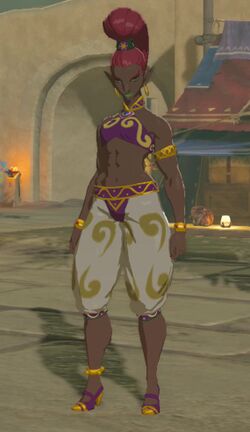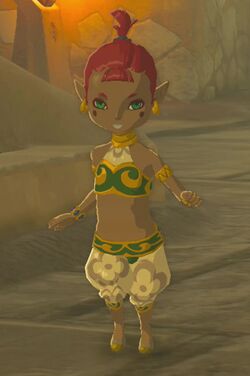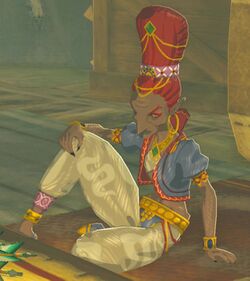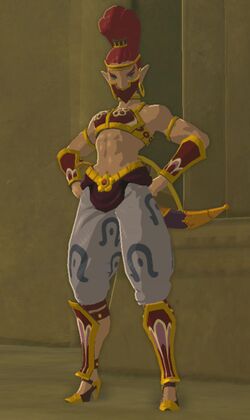Gerudo
- This article is about the virtually all-female race. For the province from Breath of the Wild named after them, see Gerudo (Breath of the Wild).
Special | Almost all women | |
Games | ||
Location | Ocarina of Time | |
Key Characters | ||
"A kid like you may not know this, but the Gerudo race consists only of women. Only one man is born every hundred years..."
The Gerudo are a recurring race in The Legend of Zelda series. The most prominent trait of the Gerudo is the race only consisting of females except one male being born every one hundred years.
Ocarina of Time
In Ocarina of Time, the Gerudo live in the Gerudo Desert, which is located northwest of Hyrule. They are a race of thieves and have a giant fortress called Gerudo's Fortress. They always live together as a pack in big forts and worship the Goddess of the Sand. They have built a huge monument for her as well as a Spirit Temple in the Desert Colossus.
Culture
The Gerudo is a dark-toned race consisting of only females with the exception of one male being born every one hundred years. That male according to legend is supposed to be their king. However, Nabooru rebelled against her king in Ocarina of Time, the king being Ganondorf. The Gerudo females are usually dressed in purple attire, have red hair and wield Shamshir-like swords. They seem to not like Hylian culture at all and the relations with Hylian men are purely for survival reasons. The Gerudo seem to think that worshipping the Golden Goddesses and having gender roles is out of the ordinary.
Majora's Mask
In Majora's Mask, the Gerudo are referred to as "pirates". They have stolen the Zora Eggs that belong to Lulu, the singer of The Indigo-Go's. Their fortress is surrounded by guards that throw Link out if he is caught.
Four Swords Adventures
Only in Four Swords Adventures is the entire Gerudo tribe friendly. Their abode is located in the Desert of Doubt. Link's passage through Gerudo Village is initially halted by closed gates. This is due to Ganondorf passing to try to claim the power of the sacred Pyramid for himself in direct violation of the Gerudo law code.
Breath of the Wild
- Main article: Gerudo (Breath of the Wild)




The Gerudo are a mostly female race primarily living in Gerudo Town. When Link first arrives at Gerudo Town, no voe (men) are allowed in to the town, requiring him to return Kara Kara Bazaar in order to buy the Gerudo Clothes so he can pass as a woman and be allowed to enter. No male Gerudo are ever met, but Gerudo voe clothing can be bought from the Gerudo Secret Club indicating that Gerudo men do indeed exist but are rarely born, similar to previous games, where the Gerudo King has been the only male baby born in the century.
Makeela Riju is the current chief of the Gerudo, having succeeded her mother after her death. She assists Link in his efforts to reclaim the Divine Beast Vah Naboris. Because of the implication of Riju being in cahoots with a voe to reclaim the Divine Beast in spite of voes being banned in town, Link cannot ever enter Gerudo Town in the game without wearing the aforementioned vai clothes, notwithstanding the great service provided to the Gerudo by reclaiming the Divine Beast.
Physiology
The Gerudo are known for being tremendously fit, tall and shapely, exceeding heights of 8 feet as adults, though they tend to become thinner and daintier when they become old. Even Gerudo not involved in combat by trade are fit, and often tower over Hylians in comparison. Adult Gerudo exhibit small torsos, wide hips and long legs, as well as a slight non-pathologic spinal lordosis that gives them a characteristic backwards lean when standing.
Gerudo young children exhibit paradoxical physiology compared to adults, presented by the fact that their torsos are big and their legs are short, which are contrary features to those of adults.
Most, if not all of Gerudo have hair colors which are variations of red; their skin colors range from dark brown (Sumati, Nali, Marta), to olive (Buliara, Isha), to leucistic (Teake, Calyban, Ashai). They also present an innate resistance to the desert heat, as well as a surprising resistance to the volcanic heat of the Eldin Province, albeit expressing discomfort towards it. As there are no Gerudo individuals in Hebra or the Gerudo Highlands, it's assumed that they are not good at tolerating cold, though the presence of the Eighth Heroine statue at the northern part of the Highlands may suggest that this is not always the case.
Their facial features are striking, with protruding noses and stern expressions, and like Hylians, they have elfin-looking ears. Gerudo sport makeup, particularly different-colored lipstick and face painting, which is also used by young girls. It's shown that the more makeup a Gerudo sports, the less striking their features become (like in the case of Urbosa). These facial features become more pronounced the older the Gerudo is.
Culture and Customs
Though most Gerudo continue to live in Gerudo Town, many leave to travel across Hyrule and are met by Link during their travels. The most frequent reason for Gerudo leaving is to either sell their wares in distant locations or to marry. With no Gerudo voe, Gerudo who wish to marry leave Gerudo Town to travel across Hyrule in hopes of finding a husband, and maintain an eager curiosity towards Voe, domestic life and the concept of marriage as a whole fueled by their isolationist status. Even after marrying, many Gerudo return to Gerudo Town to sell wares they procure during their travels.
The Gerudo are known for their pride and exuberance leading to a somewhat stubborn nature towards other Hyrulean races, albeit they are in more amicable terms with said races, unlike other previous depictions of the race. In terms of romantic prospects, it's shown that Gerudo mainly prefer Hylian partners, and may consider Gorons too removed from their preference to consider marriage or child-bearing. In spite of all this, many Gerudo are shown to be playful and goofy at times, and some are presented as being coy and flirty.
Many Gerudo are trained in combat. They are trained by Teake and Liana in Gerudo Town and guard the city to prevent any voe from entering. Gerudo guardswomen also protect Kara Kara Bazaar from the many monsters in the province. A training compound is located in Gerudo Town where Gerudo warriors train against each other and on dummies made for practice. Gerudo guardswomen greatly admire combat prowess as a trait in their fellow kin, as well as a personal goal.
Gerudo clothing is often brightly patterned and colored. Due to the heat of their home, Gerudo clothing is typically light and minimal in style. Their outfits consist of cross-neck tops with no shoulder covers and midriff baring, knee-high Gerudo Sirwals and high heels, being surprisingly swift sporting said footwear in their desert environment. They also wear jewelry like large earrings and gold arm, wrist and ankle bands. Elders often wear short coats, and soldiers sport mouth-covering masks, vambraces and shin guards.
For entertainment, the Gerudo often watch or participate in Sand-Seal Racing or can be found at the Noble Canteen where the Noble Pursuit is a favorite among the Gerudo. Local spots of interest include the Northern Icehouse, the Kara Kara Bazaar, and the Gerudo Great Skeleton.
The Gerudo Chiefdom follows a matrilineal hereditary succession system with no male influence, and it's not known what status, if any, the Chieftainess' husband holds, though it's assumed to be completely negligible. The status of past Gerudo men is not known either, other than that of Ganondorf.
The Gerudo, unlike in many previous game depictions of the race, are in good economic and social affluence in spite of the presence of the Divine Beast Vah Naboris hindering their free movement in their desert home, having amicable relations with other Hyrulean races, and being in generally good spirits. Also, unlike other depictions in previous games, the Gerudo in Breath of the Wild do not engage in banditry or other illegal activities due to marginalization.
Language
Though the Gerudo speak to visitors in Hylian, they have their own language and often use certain terms when speaking to travelers. They recommend that travelers learn a few words to help with their visit to Gerudo Town:
- Vasaaq: welcome
- Sav'otta: good morning
- Sav'aaq: good day
- Sav'orq: good-bye
- Sarqso: thank you
- Vai: woman
- Voe: man
The Great Fairy Tera, who dwells in the Gerudo Great Skeleton sometimes welcomes Link to her fountain while using these expressions.
Gerudo Weapons and Armor
In addition to being strong warriors, the Gerudo also make many weapons that are specifically designed to match Gerudo training techniques.
Their weapons and armor include:
| Weapon | Image | Description |
|---|---|---|
| Gerudo Scimitar |  |
A short, curved weapon used by Gerudo for self-defense |
| Gerudo Spear |  |
An unusually weighted spear most people are not able to use; Gerudo are specially trained in its use |
| Golden Claymore |  |
A two-handed sword used by only the most talented Gerudo |
| Moonlight Scimitar |  |
A ceremonial weapon decorated with a variety of carvings |
| Scimitar of the Seven |  |
The favored weapon of the Gerudo Champion Urbosa |
| Gerudo Shield |  |
An emblazoned traditional shield of the Gerudo; very common |
| Radiant Shield |  |
A Gerudo Captain's shield |
| Daybreaker |  |
The favored shield of the Gerudo Champion Urbosa |
| Golden Bow |  |
A bow to strike distant targets |
| Thunder Helm |  |
A precious heirloom of the Gerudo, a lightning-proof helm |
| Gerudo Set | A customary Gerudo Vai garb | |
| Desert Voe Set | A customary Gerudo Voe garb, seldom seen due to the absence of Gerudo men | |
| Radiant Set | A special garb for members of the Gerudo Secret Club |
General Trivia
- The desert in Twilight Princess is named after the Gerudo; but ironically enough, there are no Gerudo in the game. The Camps in the desert are populated by Bulblins.
- According to Hyrule Historia, Ganondorf's sharp, bird-like nose is characteristic of the Gerudo.[1]
- According to a Gossip Stone in Ocarina of Time, the Gerudo go to Hyrule Castle Town to find boyfriends.
- It's not known how the Gerudo remain a genetically distinct race, considering that they mostly require other races to reproduce while never quite homogenizing. However, it has been speculated that Hylians with red hair may be Gerudo descendants. It's also speculated that the gender unbalance may be related to the influence of the holder of the Triforce of Power, Ganondorf.
Breath of the Wild Trivia
- The Chieftainesses of the Gerudo shown in Breath of the Wild (Riju and Urbosa) are shown to be more coiffed and exuberant than other Gerudo, and are noted for their rich, flowing long hair. They are also among the only Gerudo that wear skirts. Isha, the jeweler, also seems to have a wealthy trade, sharing many attire aspects with the Chieftainesses.
- Though sold as a Gerudo customary head wear, the Gerudo Veil is used by no Gerudo women at all.
- It's shown through The Secret Club's Secret quest that not all Gerudo obey or abide to the no-Voes-allowed rule in Gerudo Town.
- Almost all Gerudo wear high heels (except the elderly).
- A recurring joke regarding Link wearing a vai garb is that, because adult Gerudo are not used to men, they can't recognize them easily. When Link speaks with Muava, a world-weary elder Gerudo, she immediately recognizes him as a Voe.
- Like the other races in the game, the Gerudo are not masters of their own land, as the looming threat of Moldugas and the Divine Beast Vah Naboris prevent them from fully controlling their native province.
- The procurement of water is implied to be one of the reasons for why the Chiefdom of the Gerudo hold power on their subjects. The palace of the chief is directly below a towering natural water spring implied to be the main source of water for the town, and the reason the town itself was built around it. The procurement of ice is also crucial, and it's made from water found in an underground spring at the Northern Icehouse, and it's transported to the town at great peril from monster attacks; this water is implied to be melt water from the slopes of the Gerudo Highlands, accounting for its coldness at the Icehouse.
Gallery
Artwork of Nabooru from Ocarina of Time
Artwork of a Gerudo Guard from Ocarina of Time
Ganondorf, a Gerudo male
A Gerudo Thief from Ocarina of Time
A Gerudo from Four Swords Adventures
References
- ↑ 1.1 1.2 "[Ganondorf's] sharp, birdlike nose is characteristic of the Gerudo." — Hyrule Historia, pg. 148









